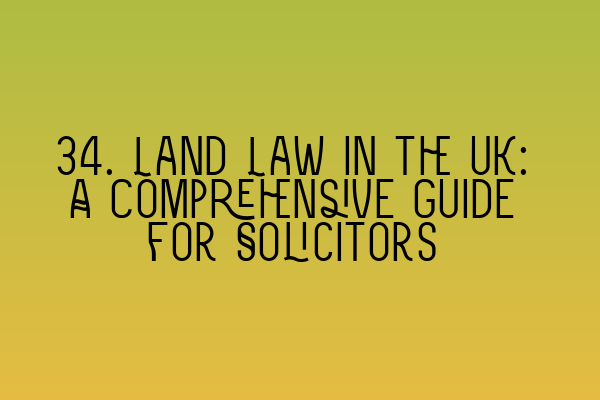Land Law in the UK: A Comprehensive Guide for Solicitors
As a solicitor practicing property law, it is essential to have a comprehensive understanding of land law in the UK. Land law governs the ownership, possession, and use of land, and it is crucial to navigate this complex area of law to provide the best legal advice to clients.
In this guide, we will provide an overview of key concepts and principles of land law in the UK, covering both freehold and leasehold interests. Whether you are a seasoned solicitor looking for a refresher or a law student preparing for the SQE, this guide will serve as a valuable resource.
Freehold Interests
Freehold is the highest form of land ownership in the UK. When someone owns the freehold of a property, they have absolute ownership and control over the land and any buildings on it.
To acquire a freehold interest, the transfer of ownership must be legally executed through a conveyance or transfer document. It is crucial to ensure that the transfer is properly registered with the Land Registry to establish a clear and valid title.
Freehold interests can be subject to various rights and restrictions, including covenants, easements, and restrictive covenants. It is important to understand the implications of these encumbrances, as they can affect the potential use and development of the land.
Leasehold Interests
Leasehold interests are another common form of land ownership in the UK, particularly in relation to residential properties. Unlike freehold, leasehold ownership grants the leaseholder a temporary right to occupy the property for a specified period.
Leasehold interests are created through a lease agreement between the landlord (freeholder) and the tenant (leaseholder). The lease agreement sets out the rights and responsibilities of both parties, including the length of the lease, ground rent, service charges, and maintenance obligations.
Leasehold ownership comes with its own set of regulations and legal considerations. As a solicitor, it is important to review lease agreements thoroughly, ensuring that the terms are fair and reasonable for the client. Understanding the leasehold enfranchisement process is also crucial, as it allows leaseholders to extend their lease or acquire the freehold of their property.
Land Registration
Land registration plays a vital role in providing security and clarity of ownership in the UK. The Land Registry is responsible for maintaining a register of land and property ownership, enabling solicitors to investigate and establish the legal title of a particular piece of land.
When dealing with land transactions, it is essential to conduct thorough searches to identify any potential issues affecting the property. Searches can reveal information about planning permissions, rights of way, restrictions, or pending disputes that may impact the client’s intended use or purchase of the land.
Succession and Co-ownership
Succession and co-ownership are important concepts in land law, particularly when dealing with family-owned properties or joint ownership. Knowing the rules and procedures for transferring ownership upon the death of a property owner or managing co-ownership disputes is crucial to provide competent legal advice.
Understanding the legal principles surrounding trusts is also essential, as co-ownership of land can involve setting up trusts to manage the beneficial interests of multiple parties. Advising clients on the creation and termination of trusts requires a solid understanding of trust law and its application in the context of land ownership.
Conclusion
Land law is a complex area that requires expertise and attention to detail. As a solicitor specializing in property law, it is essential to have a comprehensive understanding of the UK’s land law framework to provide effective legal advice to clients. By familiarizing yourself with the concepts and principles discussed in this guide, you will be better equipped to navigate the intricacies of land law and achieve favorable outcomes for your clients.
If you’re preparing for the SQE exams, make sure to check out our related articles:
SQE 1 Practice Exam Questions
SQE 1 Practice Mocks FLK1 FLK2
SQE 2 Preparation Courses
SQE 1 Preparation Courses
SRA SQE Exam Dates
